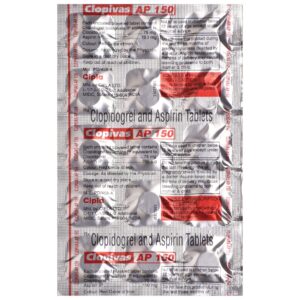ASPIRIN + CLOPIDOGREL
Aspirin: Aspirin, also known by its generic name acetylsalicylic acid, is a medication commonly used for its analgesic (pain-relieving), anti-inflammatory, and antiplatelet (blood-thinning) properties. It is available over-the-counter and in higher doses as a prescription medication.
Aspirin works by inhibiting the synthesis of certain substances in the body called prostaglandins that are involved in pain, inflammation, and blood clotting. By blocking the action of these substances, aspirin helps to reduce pain, swelling, and fever. Additionally, it inhibits the aggregation (clumping) of platelets, preventing the formation of blood clots.
The recommended daily dose of aspirin varies depending on the intended use. For pain relief and fever reduction, the typical adult dose is 325 to 650 mg taken every 4 to 6 hours as needed. For the prevention of heart attacks or strokes, lower doses in the range of 81 to 325 mg per day are often prescribed.
Despite being widely used and relatively safe at recommended doses, aspirin can have side effects. Common side effects include stomach irritation, heartburn, nausea, and bleeding. Aspirin can irritate the stomach lining, leading to the development of ulcers or gastrointestinal bleeding, particularly with long-term use or high doses. Individuals with a history of ulcers, bleeding disorders, or aspirin sensitivity should use caution or avoid aspirin altogether. Aspirin can also increase the risk of bleeding, particularly if taken in combination with other medications like anticoagulants (blood thinners).
Other rare but serious side effects include allergic reactions, ringing in the ears (tinnitus), liver damage, and Reye’s syndrome (a severe condition primarily affecting children and teenagers). It is important to follow the recommended dose and speak with a healthcare professional if any concerns or adverse effects arise.
Aspirin should not be given to children or adolescents under the age of 18, particularly if they have symptoms of a viral infection, due to its association with Reye’s syndrome. It is important to consult with a healthcare provider before starting or altering the dose of aspirin, as it may interact with certain medications or medical conditions.
Overall, aspirin is a widely used medication for its pain-relieving, anti-inflammatory, and blood-thinning effects. However, it is essential to use it responsibly, in the recommended doses, and under the guidance of a healthcare professional to minimize the potential risks and maximize its benefits.
Clopidogrel: Clopidogrel, also known by its brand name Plavix, is a medication used to prevent blood clots in individuals with various cardiovascular conditions.
The drug works by inhibiting platelet aggregation, which helps to prevent the formation of blood clots. Platelets are small cell fragments in the blood that play a crucial role in the clotting process. Clopidogrel specifically binds to the ADP receptor on the platelet surface, inhibiting the activation and aggregation of platelets. By blocking this receptor, clopidogrel reduces the risk of clot formation and helps maintain blood flow.
The standard recommended dose of clopidogrel for most conditions is 75 mg once daily, taken orally. It can be taken with or without food. However, the dosage may vary depending on the specific condition being treated and the individual’s medical history. It is essential to follow the dosage instructions provided by the doctor or pharmacist.
Clopidogrel is commonly used in several situations, including:
1. Prevention of cardiovascular events: It is frequently prescribed for individuals who have had a heart attack, stroke, or peripheral arterial disease to reduce the risk of future cardiovascular events.
2. Post coronary stent placement: It is commonly prescribed after coronary artery stenting to prevent stent thrombosis and maintain blood flow through the stented artery.
3. Acute coronary syndrome: It can be administered in combination with aspirin to manage unstable angina and non-ST-segment elevation myocardial infarction (NSTEMI).
Like any medication, clopidogrel can cause side effects. Common side effects may include:
– Bleeding: Since clopidogrel reduces platelet aggregation, it can increase the risk of bleeding. This may manifest as nosebleeds, easy bruising, prolonged bleeding from cuts, or gastrointestinal bleeding.
– Upset stomach or gastric discomfort: It can cause abdominal pain, indigestion, or diarrhea in some individuals.
– Headache and dizziness: Although less common, some people may experience headaches or dizziness as side effects.
– Allergic reactions: Rarely, individuals may develop an allergic reaction to clopidogrel, characterized by rash, itching, swelling, or difficulty breathing. Seek immediate medical attention if this occurs.
It is important to inform your healthcare provider about any other medications, supplements, or medical conditions you have before starting clopidogrel, as it can interact with certain drugs and increase the risk of bleeding.
Please note that this information is not exhaustive, and it is always advisable to consult a healthcare professional for personalized advice and specific information regarding this drug.



